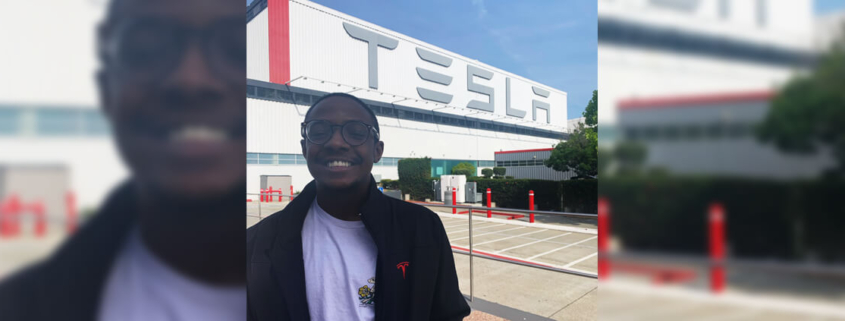Vincent Glover’s UGA experience led to internships with Tesla and NASA
Written by Abby Carney
When he was just a tot, still leg-swinging height, Vincent Glover knew he would be a Georgia Bulldog one day. Every detail of his childhood bedroom was red and black, curtains, dresser, comforter, big-G pillows, the whole 100 yards. Downstairs, his mother collected his news clippings and displayed his trophies in a special room. A talented pianist and all-around musician, Glover’s parents gave him his first drum set when he was just two or three years old. He got his start playing the piano in the funeral parlor his family still owns today in Perry, Georgia, about two hours south of Atlanta and Athens, or as Glover describes it, smack dab in the middle of the state, a small town best known as the site of the annual Georgia National Fair.
It might not be what you’d expect from an aspiring engineer who recently interned at Tesla as well as for an oil and gas company, where he focused on air pollution issues. But math is poetry, and Glover says you might be surprised that he wasn’t the only Tesla engineer who’s also a musician.
“It’s the process of creating something that kind of overlaps in my vision—you’re trying to express something,” he said. “You have syntax and semantics that mean certain things, can play a certain order. The melody, if you want it to be happy or sad, you know, it has to be designed with a specific purpose in mind.” The same can be said about designing technical projects.
Growing up, Glover felt like the scope of what he could accomplish in his hometown was limited. While most of his peers were on the agricultural studies path, Glover was playing piano gigs for local churches and flourishing under the guidance of his music teacher, a local man who played with The Temptations in his heyday. Graduating fourth in his high school class, Glover entered the University of Georgia with both music and engineering scholarships. He earned a coveted spot as a percussionist with the Redcoat Marching Band. And while he’d discovered his love for the STEM world in high school, it wasn’t until midway through his sophomore year, when he was taking a design methodology class, that he homed in on environmental design as a potential engineering career path.
That year, while balancing music classes and band practice, he began pondering whether to pivot to design engineering. The design methodology course—part of UGA’s New Materials Institute—was partially sponsored by the non-profit Parley for the Oceans, in collaboration with Adidas. It culminated in a research trip to the Dominican Republic, an experience that provided the answer Glover was seeking. While there, he had the opportunity to implement a design he worked on to retrieve ocean-bound plastics from rivers, reducing pollution and improving waste treatment infrastructure. He said the experience showed him design engineering was definitely something he wanted to do for the rest of his life.
That course also led to Glover strengthening his ties to Thomas Hamby, the man who would become his mentor and the donor behind the Georgia Commitment Scholarship he was awarded that year. It completely altered his life’s path.
The scholarship gave him the ability to stay focused on his studies, helping him home in on his true passions and aspirations, rather than just chasing the job and career with the biggest payoff. “Ultimately, that was really life changing,” he said. “It is tough to be a college student and not really have money and want to do all the stuff that you want to do, and ultimately, having that flexibility without having to worry about it—that goes a long way toward being successful.”
Throughout his undergraduate career, he’s been pursued for competitive internships at high-profile companies, spending last spring at a Tesla factory in California—a “breathtaking, fresh experience,” he said. Most recently, he worked for ABSL Space Products, a lithium-ion battery manufacturer that focuses on space applications. They run tests to ensure the batteries are viable for use on space missions, and while interning there, Glover had the opportunity to work on testing and design for the Space Launch System (SLS) rocket for Artemis IV; he was in the room for final critiques on the James Webb Space Telescope and other high-profile projects and clients like the Europa Clipper and Boeing.
He’s been in such high demand that he’s had to make the difficult decision to delay the start of his master’s program in engineering at UGA. When NASA came knocking, it was an opportunity he couldn’t refuse, so this fall, Glover relocated to the Johnson Space Center in Houston. There, he’s working closely with his mentor, Eric Darcy, the space program’s battery technical lead, and the spearhead of this technology.
Glover isn’t quite sure what the future will hold, but he’s excited to return to his engineering studies soon, and he’ll see what awaits on the other side of that degree, be it in the world of music, engineering, or if some miracle allows, a way to combine his two loves. Wherever he goes, he’ll always march to the beat of his own drum.




